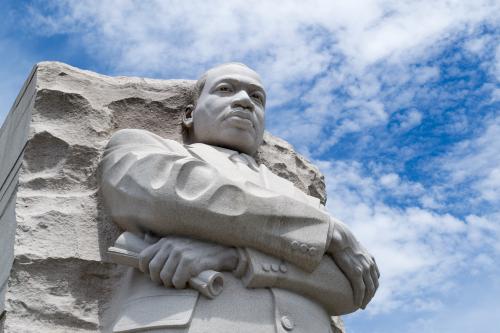Our democracy hinges on whether we will protect people of color—whether they are American or not—from racism.
On Sunday, June 24, President Donald Trump asserted that the country should abandon due process laws for refugees who seek asylum in America. Trump’s “zero-tolerance” immigration policy has led to the separation of at least 2,300 children from their migrant parents since its enactment, causing irreparable trauma, according to many experts.
“We cannot allow all of these people to invade our Country,” Trump tweeted before golfing at his course in Virginia. He continued, “When somebody comes in, we must immediately, with no Judges or Court Cases, Bring them back from where they came.” Those of us who have been cast as the other, the transgressor, or stranger recognize the insolent use of pronouns and slurs to sway the court of public opinion.
It would be inconceivable that any president would even think of the idea that they should get rid of courts and judges—if the assertion was not about keeping people of color in their place. About two weeks before Trump’s plea to eviscerate the country’s foundational legal standard of due process, his maligned Attorney General Jeff Sessions sought to deny entry of rape and domestic violence victims based on the need to maintain “the rule of law,” New York Magazine reported. To be clear, bigots never apply laws fairly or consistently.
Trump’s immigration policies are hurting thousands of people, including children who have been ripped from their families in what will certainly be a shameful chapter in American history. His rhetoric aims to sever brown immigrants and other people of color from the idea that we can be citizens, and he intends to split justice from democracy to justify his unpardonable actions—just as his predecessors did with slavery and internment camps. Time and time again, elected leaders have failed to embrace the other, mocking democracy in the process.
Time and time again, elected leaders have failed to embrace the other, mocking democracy in the process.
While Trump’s actions represent a marked departure from recent administrations’ approach to immigration policy, they are not new. American policies have mistreated blacks, Asians, Native Americans, and Latinos throughout history in ways no different than what immigrants are currently dealing with at the Mexican border. Enslaved Africans were separated and sold to different slave owners. Congress enacted the Chinese Exclusion Act of 1882 to prevent Chinese immigrant workers from taking white people’s jobs. Japanese-American internment camps during World War II were instituted through executive order under the guise of national security. And millions of black Americans have been imprisoned for nonviolent offenses to supposedly keep communities safe (read: white).
What is new is that Trump is clearly capitalizing on what The New York Times columnist Charles Blow has termed “white extinction anxiety.”
“For the first time since the Census Bureau has released these annual statistics,” wrote Brookings demographer William Frey, “they show an absolute decline in the nation’s white non-Hispanic population—accelerating a phenomenon that was not projected to occur until the next decade.”
“The good news for the nation is that white aging and potential future declines will be countered by gains in racial minorities,” Frey writes. “These populations increased by 4.7 million in the two years that the white population declined, including gains of 2.4 million among Hispanics, 1.1 million among Asians, and 1.2 million among all other races, according to the new estimates.”
The racial makeup of the United States may change, but when white power lies in the balance, the unspeakable becomes acceptable. Trump’s inane brusqueness and profound ignorance of the Constitution has brought clarity to what much of the current “culture war” is about: a verbal and political assault on brown immigrants, people of color, and democracy. Upon taking office in January 2017, Trump issued a travel ban on seven (thereafter reduced to five) Muslim countries, ostensibly to prevent attacks by Islamic militants. He disparaged Haiti, El Salvador, and African countries as “shithole countries” in January 2018. Thousands of Americans still lack electricity in Puerto Rico nine months after Hurricane Maria, prompting the Boston Globe editorial board to write, “Puerto Ricans’ status as second-class citizens has become painfully evident in Maria’s aftermath.”
The racial makeup of the United States may change, but when white power lies in the balance, the unspeakable becomes acceptable.
Trump is making good on his racist platform by delivering casualties of war to his voting base. The latest set of actions to separate brown refugee babies from their parents at the Mexican border appears to be a line that most Americans weren’t willing to cross. He signed an executive order to end the plainly immoral and hurtful practice that he himself instituted; however, that proverbial line is in a xenophobic end zone surrounded by adoring Trumpers and feckless Republican legislators who are too scared to hold Trump accountable.
The demographics are clear: We are in this together. A country isn’t a person; America is white only in the eyes of a racist. America is comprised of citizens and potential citizens of different hues who can make America into the democracy we all deserve. When we tie our fates to the brown immigrant child—see and treat her like a future citizen—we may save a democracy from the racism that has our ugly history repeating itself.
The Brookings Institution is committed to quality, independence, and impact.
We are supported by a diverse array of funders. In line with our values and policies, each Brookings publication represents the sole views of its author(s).







Commentary
Trump reveals ‘zero tolerance’ for democracy
June 25, 2018